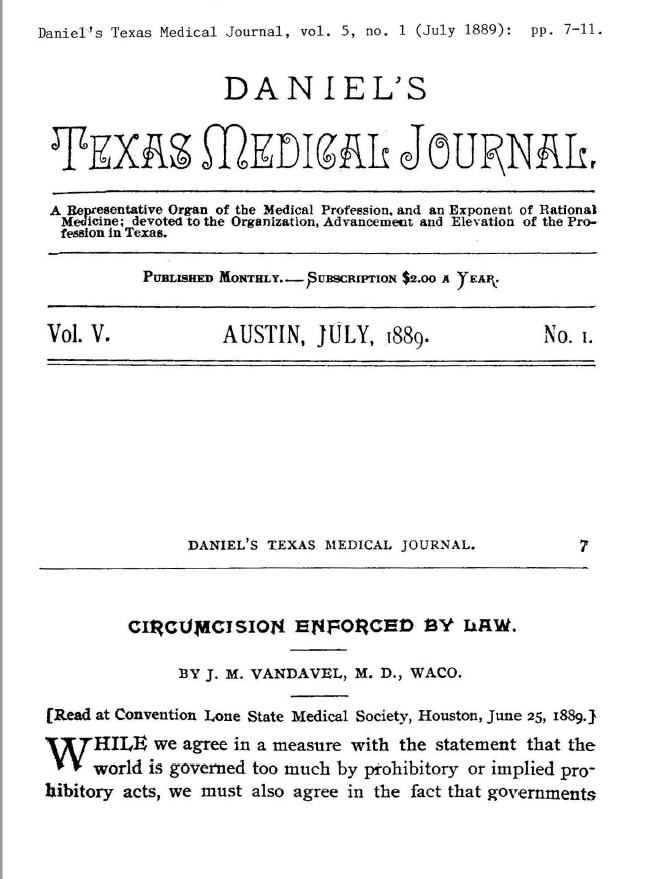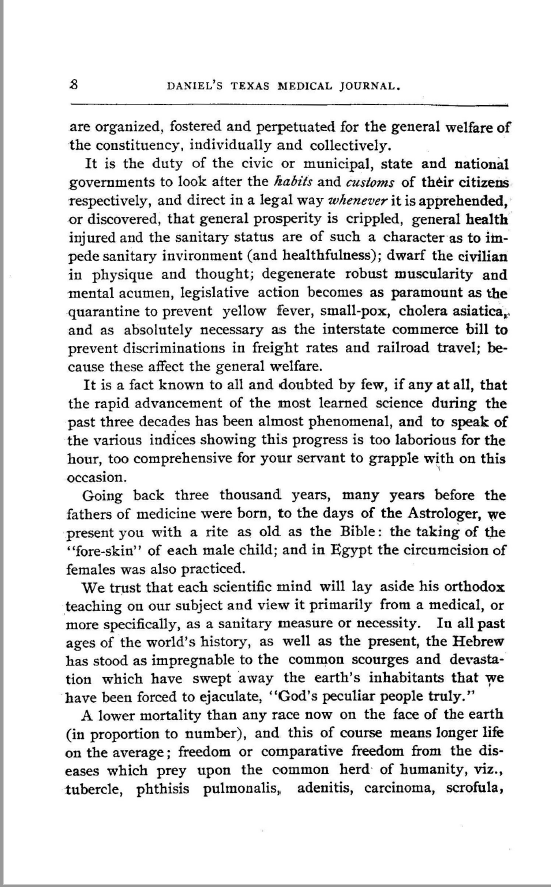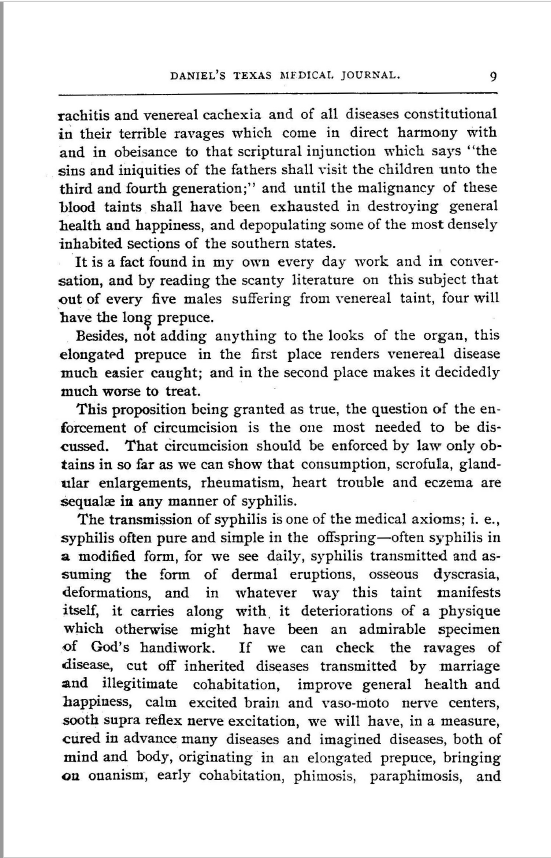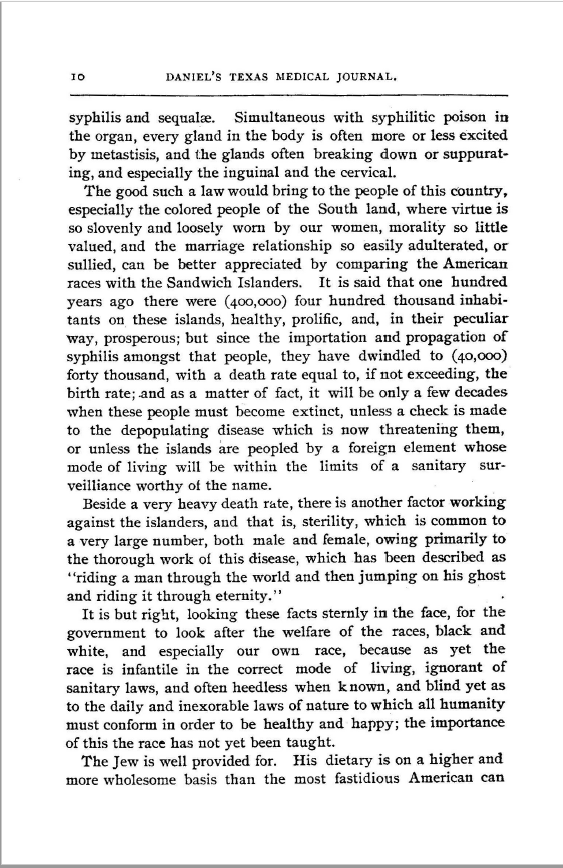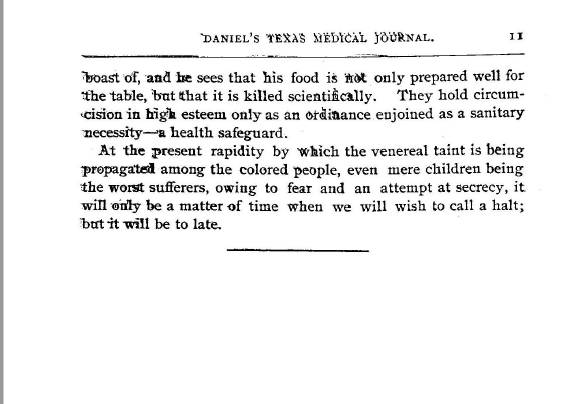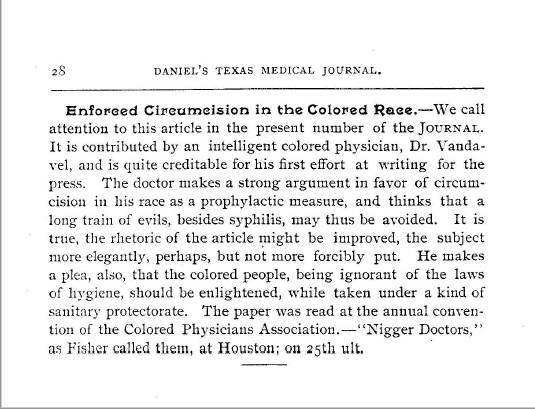| |
"We feel fully
warranted in suggesting
the wholesale circumcision of the Negro race"
Genital cutting and racism
|
Genital cutting has
inevitably been associated with racism and
stereotyping, because different cultural and ethnic groups have
traditionally either
all cut or all not cut their children's genitals, giving it a strong
association with racial or cultural identity. It's hard to say which
came first, the cutting or the identity.
"In that ye have brought into my
sanctuary
strangers, uncircumcised in heart, and uncircumcised in flesh, to be
in
my sanctuary, to pollute
it..."
|
- Ezekiel, 44:7
This plays into the "clean/unclean" dichotomy: "We" are "clean". "They"
are "dirty".
It is also common to stereotype out-groups as sexually irresponsible
or insatiable, and one of the reasons for cutting both males and
females has been to tame their otherwise unbridled libidos..
|
1889 J. M.
Vandavel
An
African-American doctor in Waco, Texas, J W Vandavel
advocated male
genital cutting for diseases no longer heard of -
"tubercle [symptom of TB], phthisis
pulmonalis [wasting away caused by TB], adenitis [swollen abdominal
lymph nodes], carcinoma [cancer], scrofula
[swollen lymph nodes of the neck], rachitis [rickets], venereal
cachexia [weakness and wasting]...onanism [masturbation],
early cohabitation, syphilis" - and for "the looks of the
organ."
"The good such a law would bring to the people of this country,
especially the colored
people of the South land, where virtue is so
slovenly and loosely worn by our women, morality so little valued and
the marriage relationship so easily adulterated, or sullied,
can be
better appreciated by comparing the American races with the Sandwich
Islanders [Hawai'ians]. It is said that one hundred years ago there
were (400,000) four hundred thousand inhabitants on these islands,
healthy, prolific and, in their peculiar way, prosperous; but since the
importation and propagation of syphilis amongst that people, they have
dwindled to (40,000) forty thousand.... " (panel 4)
(Dr Vandavel was apparently unaware that the
Hawai'ian men were genitally cut.)
The editorial
patronizes Dr Vandavel but endorses his internalized racism , and says
he "makes a strong argument in favor of circumcision in his race as a
prophylactic measure". (Language advisory: mentions use of
the n-word. ult.= last month) |
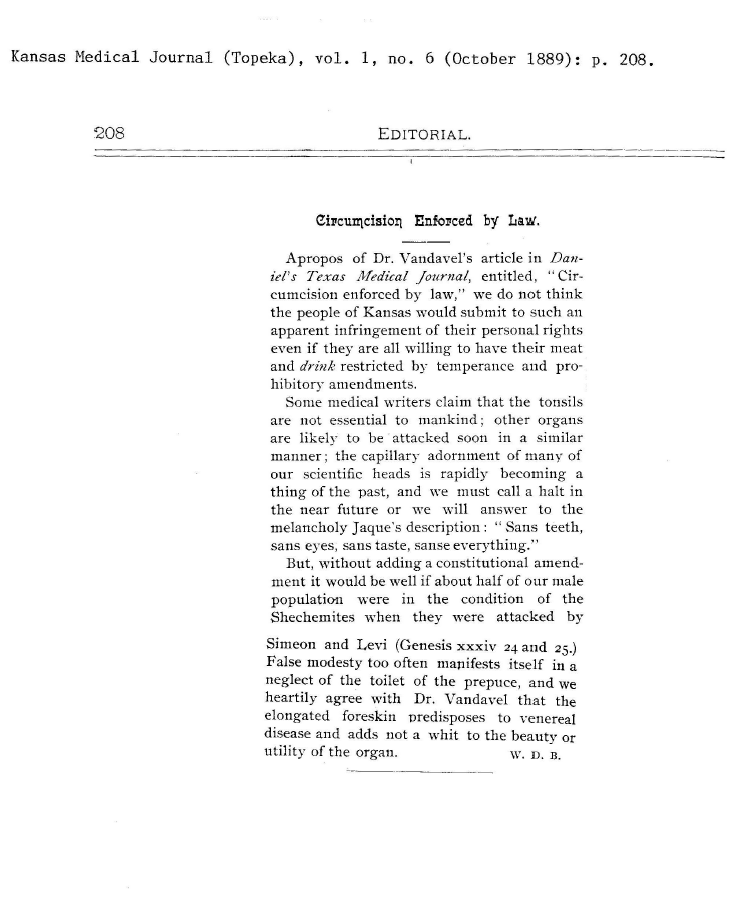 |
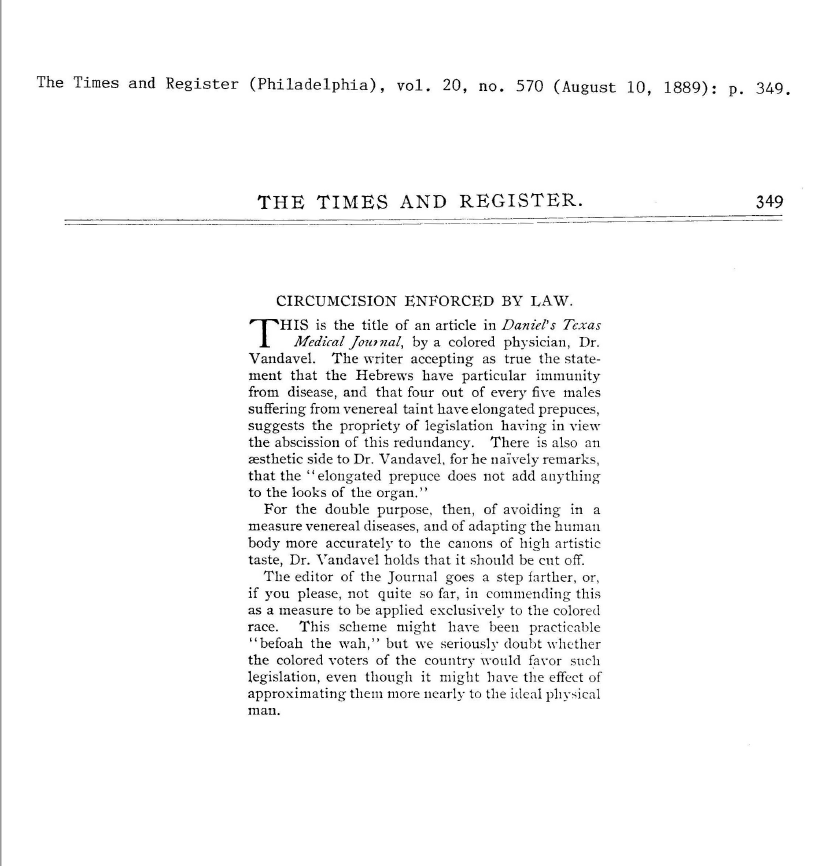 |
In the Kansas Medical Journal,
"W.D.B." ignores the racial aspect of Dr Vandaval's proposition and
thinks it would not be accepted in Kansas, but agrees with him about
the dangers of "the elongated foreskin" and says "it would be well if
about half our population were in the condition of the Chechemites when
they were attacked by Simeon and Levi (Genesis xxxiv 24 and 25.)"
("...every male in the city was circumcised. ...all of them
were still in pain..."). W.D.B. does not specify which half.
Further north in Philadelphia, the Times and Register has a
little dig at the Southern accent and doubts that "the colored voters
of the country" would support mandatory genital cutting. It
considers the aesthetic argument "na´ve" though it goes on to say that
genital cutting "approximat[es] them more nearly to the ideal physical
man."
|
Dr P C
Remondino
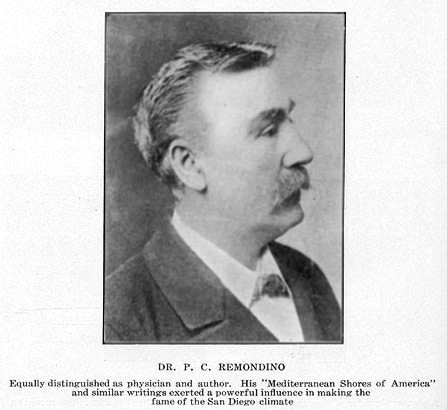
Peter Remondino was a San Diego doctor who specialized
in
respiratory ailments. He is single-handedly responsible for the meme still
current today, that the foreskin was useful when we ran naked through
the brambles, but no longer is today.
|
H I S T O R Y
OF
CIRCUMCISION
FROM THE EARLIEST TIMES TO THE
PRESENT
MORAL & PHYSICAL REASONS
FOR ITS PERFORMANCE
WITH A
HISTORY OF EUNUCHISM, HERMAPHRODITISM,
ETC., AND
OF THE DIFFERENT OPERATIONS PRACTISED
UPON THE PREPUCE
BY P.C. REMONDINO M.D.
(JEFFERSON)
CHAPTER
XVIII.
THE PREPUCE AS AN OUTLAW,
AND ITS EFFECTS ON THE GLANS
...Puzey,
of Liverpool, has found [the foreskin] of extreme value, and even
unequaled by any other part of the body, for furnishing skin-grafts,81 .... In advising
the use of the prepuce for these purposes it must not be overlooked
that in
case of a white man
it would not do to use skin of any other color besides his own. We have
no data to base any assertion as to the relative action of skin-grafts
taken from Mongolians or Indians, but we have very reliable data in
relation to the proliferating action of those of the negro,82
which induces a growth of epidermis of its own kind; so that preputial
grafts from the negro, combining the extra vitality and proliferation
of the preputial tissue with the strong animal vitality of
the negro,
if applied to a white man, might not produce the most desirable
cosmetic effects, especially if on one side of the countenance.
|
The
text of the entire book has now been posted on the Project
Gutenberg website.
Remondino seriously thought
circumcision would reduce
rape - and seems to have accepted lynching as axiomatic.
|
"From our observations
and experience in such cases, we feel fully warranted in suggesting the
wholesale circumcision of the Negro race as an efficient remedy in
preventing the predisposition to discriminate raping [= preferentially raping white women]
so inherent in that race. We have seen this act as a valuable
preventive measure in cases where an inordinate and unreasoning as well
as morbid carnal desire threatened physical shipwreck; if in such cases
the morbid appetite has been removed or at least brought within
manageable and natural bounds, we cannot see why it should not - at
least in a certain beneficial degree - also affect the moral stamina of
a race proverbial for the leathery consistency, inordinate redundancy,
generous sebaceousness and general mental suggestiveness and
hypnotizing influence of an unnecessary and rape, murder and lynching breeding prepuce."
|
- P.C. Remondino MD, "Questions of
the day:
Negro rapes and their social problems",
National Popular Review, Vol. 4,
January 1894, pp. 3-6
Remondino's proposal was supported by several medical
journals,
including the Maryland Medical Journal and the Boston Medical and
Surgical Journal (now the New England Journal of Medicine).
|
|

